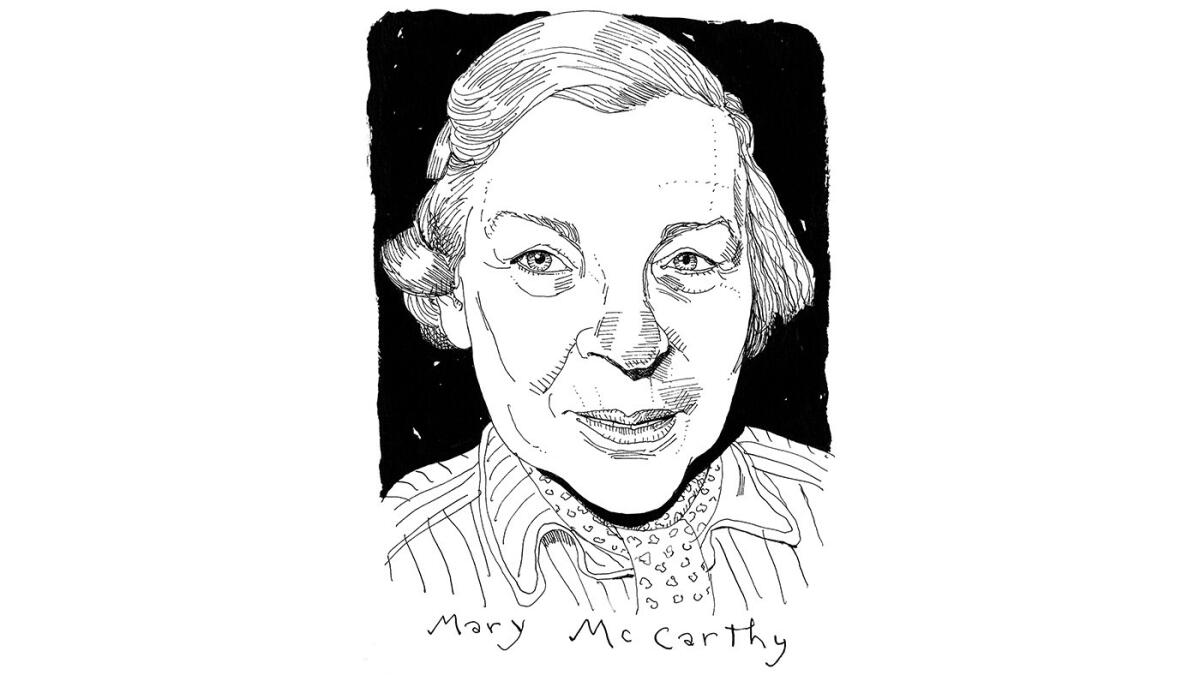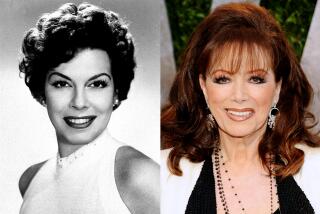Literary Idol: Meg Wolitzer on Mary McCarthy

- Share via
Literature is a lonely art, but writers keep company with the heroes on their bookshelves. We asked five Festival of Books participants to pay tribute to authors who inspired them.
I wrote a fan letter to Mary McCarthy when I was in college, having read and admired her for years — not just because of her novel “The Group” but also because of her other writing, including her short stories, literary criticism, journalism, and her masterful memoir, “Memories of a Catholic Girlhood.”
But my interest in her went beyond the page and into my sense of her as a person in the world — a sense that I gleaned from biographies and from photos, which showed this extremely stylish woman with a facial expression that revealed wit, sophistication and fierceness, all of which I craved. Then of course there was the famously fierce dust-up between McCarthy and Lillian Hellman. When McCarthy said of Hellman on “The Dick Cavett Show” that “every word she writes is a lie, including ‘and’ and ‘the,’” Hellman sued for more than $2 million.
In addition to fearing, as a young person, that I lacked sophistication, I also feared that I lacked courage. It was hard for me to say something even mildly tough about someone else or their work; hard for me, generally, to be critical. McCarthy had no such trouble: She was, after all, a critic. But had she only been piquant, and not tough, brilliant and in possession of wide-roaming interests and opinions, she would not have been a writer I admired. She wasn’t only one thing, and this above all else was why I had written her a letter.
FULL COVERAGE: FESTIVAL OF BOOKS
She wrote back, promptly, a lovely letter in a fine hand on very thin stationery, mailed from her Paris home. To my horror, I have no idea where the letter is. In my very un-Mary McCarthyish way, I threw it on a pile, and then went off chaotically to be with my friends. I lacked the discipline of McCarthy, to be sure. A little bit more of that would come eventually, but not yet.
Several years after our exchange, I met McCarthy at the MacDowell Colony, where I was living in a cabin writing a book (my first novel had been published a couple of years earlier), and she was being honored. This, as it would turn out, was five years before her death. She seemed both frail and acerbic, and I recall her giving a speech that partly had to do, if I remember it correctly, with the dangers of relying on credit cards.
I was disappointed and confused. Why wasn’t she giving young artists like me life advice? I introduced myself to her afterward, feeling deeply shy and awkward. Of course, looking back, I suspect that McCarthy, in her own tart and specific way, had been giving good advice to artists and that her talk had some prescience. It was not entirely what I would have expected, though, which of course is what’s always to be expected from a free-thinking writer.
I’ve taught “Memories of a Catholic Girlhood” to students over the years, and quite a few of them have only been vaguely aware of McCarthy’s name, and some of them haven’t been aware of it at all. Some students have loved the book, while others called it slow, a relic from a mostly vanished world.
Me, I still find it to be perfect, and in its perfection I feel that the world of that book and that writer hasn’t vanished at all, but that it’s still vivid and present, even now.
Wolitzer will appear at the Festival of Books on April 18. She is the author, most recently, of “The Interestings,” a novel, and the YA book “Belzhar.”
MORE FROM FESTIVAL OF BOOKS:
Times’ celebration of the written word opens its 20th chapter
Photos: Los Angeles Times Festival of Books: A look back
Interactive game: How to be a writer
More to Read
Sign up for our Book Club newsletter
Get the latest news, events and more from the Los Angeles Times Book Club, and help us get L.A. reading and talking.
You may occasionally receive promotional content from the Los Angeles Times.










